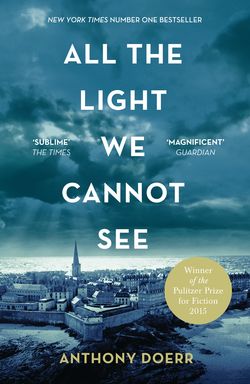Читать книгу All the Light We Cannot See - Anthony Doerr, Anthony Doerr - Страница 49
Brittany
ОглавлениеIn the morning an ancient furniture lorry stops for them. Her father lifts her into its bed, where a dozen people nestle beneath a waxed canvas tarp. The engine roars and pops; the truck rarely accelerates past walking speed.
A woman prays in a Norman accent; someone shares pâté; everything smells of rain. No Stukas swoop over them, machine guns blazing. No one in the truck has even seen a German. For half the morning, Marie-Laure tries to convince herself that the previous days have been some elaborate test concocted by her father, that the truck is moving not away from Paris but toward it, that tonight they’ll return home. The model will be on its bench in the corner, and the sugar bowl will be in the center of the kitchen table, its little spoon resting on the rim. Out the open windows, the cheese seller on the rue des Patriarches will lock his door and shutter up those marvelous smells, as he has done nearly every evening she can remember, and the leaves of the chestnut tree will clatter and murmur, and her father will boil coffee and draw her a hot bath, and say, “You did well, Marie-Laure. I’m proud.”
The truck bounces from highway to country road to dirt lane. Weeds brush its flanks. Well after midnight, west of Cancale, they run out of fuel.
“Not much farther,” her father whispers.
Marie-Laure shuffles along half-asleep. The road seems hardly wider than a path. The air smells like wet grain and hedge trimmings; in the lulls between their footfalls, she can hear a deep, nearly subsonic roar. She tugs her father to a stop. “Armies.”
“The ocean.”
She cocks her head.
“It’s the ocean, Marie. I promise.”
He carries her on his back. Now the barking of gulls. Smell of wet stones, of bird shit, of salt, though she never knew salt to have a smell. The sea murmuring in a language that travels through stones, air, and sky. What did Captain Nemo say? The sea does not belong to tyrants.
“We’re crossing into Saint-Malo now,” says her father, “the part they call the city within the walls.” He narrates what he sees: a portcullis, defensive walls called ramparts, granite mansions, a steeple above rooftops. The echoes of his footfalls ricochet off tall houses and rain back onto them, and he labors beneath her weight, and she is old enough to suspect that what he presents as quaint and welcoming might in truth be harrowing and strange.
Birds make strangled cries overhead. Her father turns left, right. It feels to Marie-Laure as if they have wound these past four days toward the center of a bewildering maze, and now they are tiptoeing past the pickets of some final interior cell. Inside which a terrible beast might slumber.
“Rue Vauborel,” her father says between pants. “Here, it must be. Or here?” He pivots, retraces their steps, climbs an alley, then turns around.
“Is there no one to ask?”
“There’s not a single light, Marie. Everyone is asleep or pretending to be.”
Finally they reach a gate, and he sets her down on a curbstone and pushes an electric buzzer, and she can hear it ring deep within a house. Nothing. He presses again. Again nothing. He presses a third time.
“This is the house of your uncle?”
“It is.”
“He doesn’t know us,” she says.
“He’s sleeping. As we should be.”
They sit with their backs to the gate. Wrought iron and cool. A heavy wooden door just behind it. She leans her head on his shoulder; he pulls off her shoes. The world seems to sway gently back and forth, as though the town is drifting lightly away. As though back onshore, all of France is left to bite its fingernails and flee and stumble and weep and wake to a numb, gray dawn, unable to believe what is happening. Who do the roads belong to now? And the fields? The trees?
Her father takes his final cigarette from his shirt pocket and lights it.
From deep inside the house behind them come footfalls.
